
My first degree in college was a B.S. in Mining Engineering. What the heck is a mining engineer, you ask? A mining engineer is involved with the engineering aspects related to the extraction of minerals from the earth, either underneath or on the ground. A mining engineer may manage any phase of a mining operation, from exploration and discovery of the mineral resources, through feasibility study, mine design, development of plans, production and operations to mine closure.
According to Wikipedia, the ancient Romans were the early innovators of mining engineering. They developed large scale mining methods, including the use of large volumes of water brought by aqueducts for hydraulic mining. The exposed rock was then attacked by fire-setting where fires were used to heat the rock, which would be quenched with a stream of water. The thermal shock cracked the rock.
The Colorado School of Mines indicates that a mining engineering student’s studies include rock mechanics, rock fragmentation, plant and mine design, mine ventilation, surveying, valuation, industrial hygiene, mineral law, mine safety, computing, mineral processing, solution mining and operations research.
My first job out of college was as a mining engineer. It was during an extreme down-cycle in mining. I worked for a bit more than 2 years for the US Bureau of Mines, in Denver. In case you’ve never heard of the Bureau of Mines, it no longer exists. There were so many colorful characters there, it really made a huge difference. When not in the office, we were usually at some underground coal mine somewhere, trying to better our understanding of ground control, which means keeping the mine roof from collapsing in, at least until you want it to.
Anyway, don’t ask me to explain any more about mining engineering. I hung up my mining engineering career when I became a geotechnical engineer, and I’ve hardly ever looked back.

